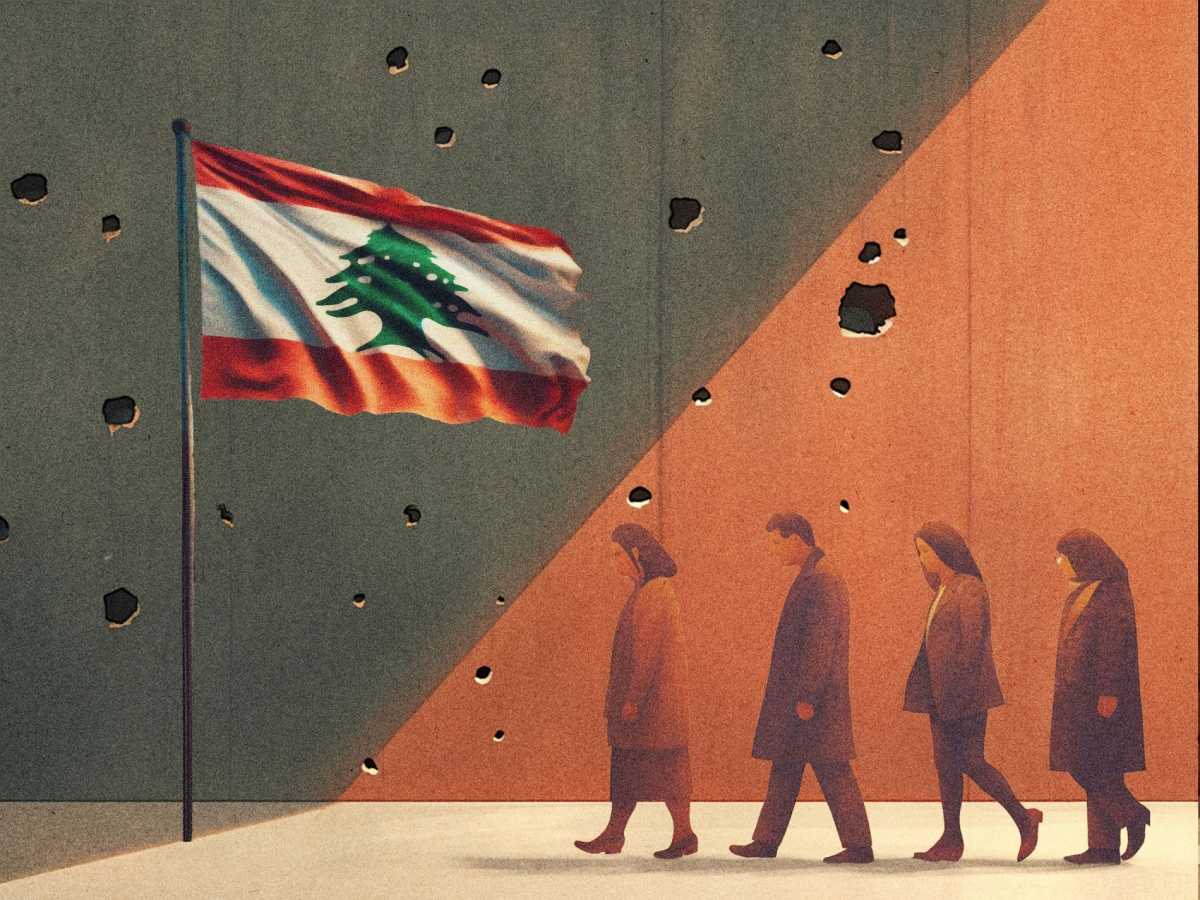Lebanon’s Empty Institutions and the Architecture of Collapse
Artwork by Lina Jaradat, featured in Al Majalla.
Many debates on Arab politics revolve around the absence of institutionalization as a root cause of underdevelopment, corruption, and authoritarianism. This absence is often contrasted with the prevalence of personal rule — the dominant form of governance in much of the Arab world. Leading scholars and analysts have long emphasized the urgent need to shift Arab politics away from personalism and toward institutionalism, where laws, not individuals, determine the course of governance. The appeal of institutions lies in their promise of stability, continuity, and accountability beyond the whims of individual leaders.
Lebanon, my native homeland, offers a textbook example of a country where the lack of functional institutions continues to impede political development. For decades, Lebanon has experienced intermittent episodes of institutional dysfunction, resulting in a fragile, unpredictable political system. During such periods, decisions are often made arbitrarily, with survival hinging more on nepotism, bribery, or luck than on transparent or equitable governance.
This institutional fragility cuts across all branches of government — executive, legislative, and judicial. As recently as early this year, Lebanon had no sitting president. The office had remained vacant for two and a half years. On January 9, Parliament finally convened to elect a new president and designate a prime minister, after the country had operated under a caretaker cabinet for years. Yet even then, the process was tainted: Members of Parliament willfully blocked the quorum, undermining the Constitution to ensure a prearranged outcome. When Joseph Aoun was ultimately elected, he delivered a foundational speech — akin to a constitutional address — vowing to disarm Hezbollah and restore state monopoly over the use of force. Prime Minister-designate Nawaf Salam followed with a ministerial statement that received parliamentary approval. But both leaders failed to act on their commitments.
In systems where governance revolves around individuals rather than institutions, politics often takes on human characteristics — “manipulative,” “unpredictable,” or “demanding.” Such language allows people to relate to political life through familiar terms. Yet it also highlights a stark reality: in the absence of strong institutions, the behavior of a single leader can come to define the entire political order. This personalization of power distances politics from collective responsibility, making it volatile and erratic.
A serious discussion of institutionalization in Lebanon must also confront the near-total absence of checks and balances and separation of powers — concepts most famously associated with Montesquieu. Yet in Lebanon, these principles are more rhetorical than real. For checks and balances to function, all three branches of government must operate effectively. Today, none do. Parliament rarely convenes and rarely legislates; the executive branch, even when willing, is hamstrung by the constraints imposed after the Civil War-era constitutional reforms. Meanwhile, the judiciary suffers from chronic corruption, with many judges prioritizing political allegiance over the impartial rule of law.
Political analyst Marwan Harb addresses these dynamics in his essay “Who Rules Lebanon?” published in Al Modon.* He portrays the country as mired in institutional collapse and political decay. According to Harb, Lebanon has shifted from governance to what he calls "improvisational survival." Traditional institutions — the presidency, parliament, and council of ministers — have become hollow shells, offering the appearance of authority but masking deep paralysis. He concludes bleakly: “Lebanon is not governed; it is managed.”
This “management” occurs through temporary arrangements, sectarian compromises, and informal backroom deals that erode any chance for a unified national project. Even amid despair, many Lebanese express pride in their human capital, often declaring, “We have exceptional talents who’ve made global contributions.” But others counter: talent alone is not enough. Visions require institutions to be realized, whether in education, healthcare, finance, or national defense. Without institutions to implement and sustain reform, even the most inspired ideas remain aspirational.
Harb repeatedly underscores that Lebanon’s political system, though superficially operational, is in reality both fragile and makeshift. Decisions are driven less by the public good than by personal and sectarian interests. Accountability is scarce. Outcomes rely not on predictable rights or protections, but on improvisation and fortune.
The system invites condemnation, frequently described as unjust or prejudiced. These criticisms largely stem from the absence of functional institutions — mechanisms essential to promoting fairness, equality, and justice. Unlike rulers who serve their interests and allies, institutions are meant to serve everyone equally. Whether courts, police, or public health services, institutions can provide the foundational support for a just society if they are allowed to function.
Perhaps the most disturbing insight is that Lebanon’s collapse is not a looming possibility — it is already underway. Political elites exploit the lack of accountability to maintain their grip on power. Citizens are not merely victims; they actively participate in a survival-based system. They rely on remittances, visas, and patronage to get by. As a Lebanese who follows my country both emotionally and intellectually, I have watched leaders resort to makeshift solutions: encouraging emigration, banking on expatriate remittances, and improvising at every turn. Instead of laying the groundwork for a rational state, they have constructed a theatrical space for “heroic leaders.” In the absence of strong institutions, collapse becomes a foregone conclusion.
In his final analysis, Harb mourns the disappearance of national meaning in Lebanon. Citizens have grown alienated from any sense of shared purpose or collective identity. This breakdown, he argues, is not accidental — it was engineered by elites who thrive in chaos, manipulating disorganization to sustain their dominance. And while Harb resists casting citizens as mere victims, he also shows how they become complicit. By prioritizing individual survival over structural reform, they help reproduce the very system they suffer from. In the end, the line between the oppressed and the collaborator becomes dangerously blurred.
*Marwan Harb’s essay, “Who Rules Lebanon?” was published in Arabic in Al Modon.
This article appeared in Inside Al Jadid Reports, No. 130, 2025.
Copyright © 2025 AL JADID MAGAZINE

